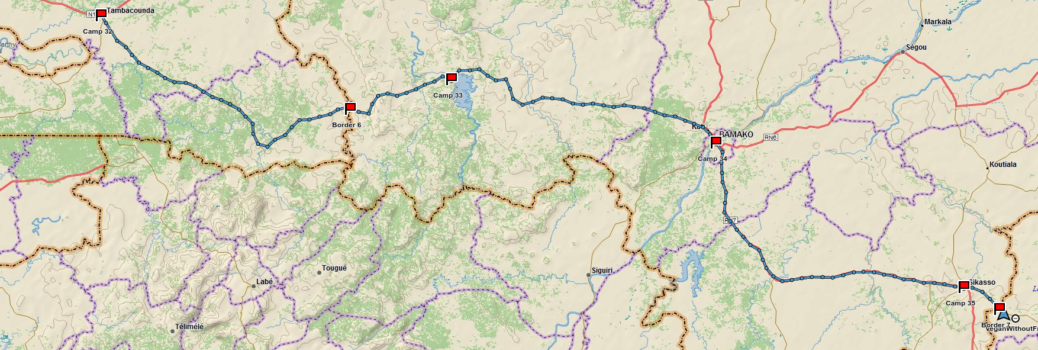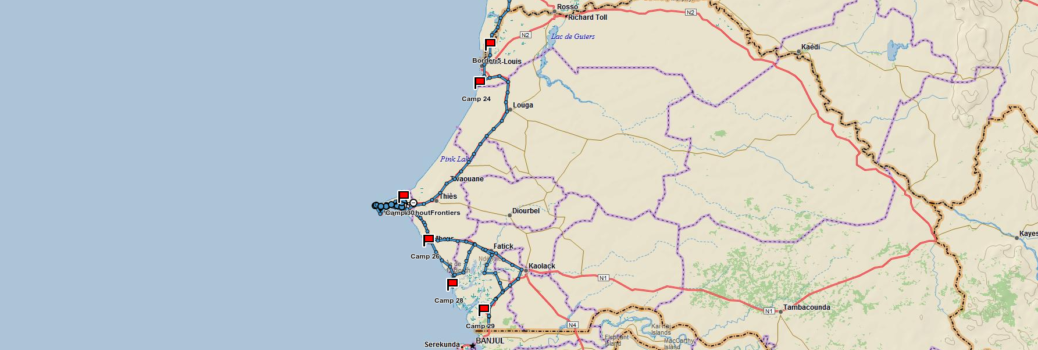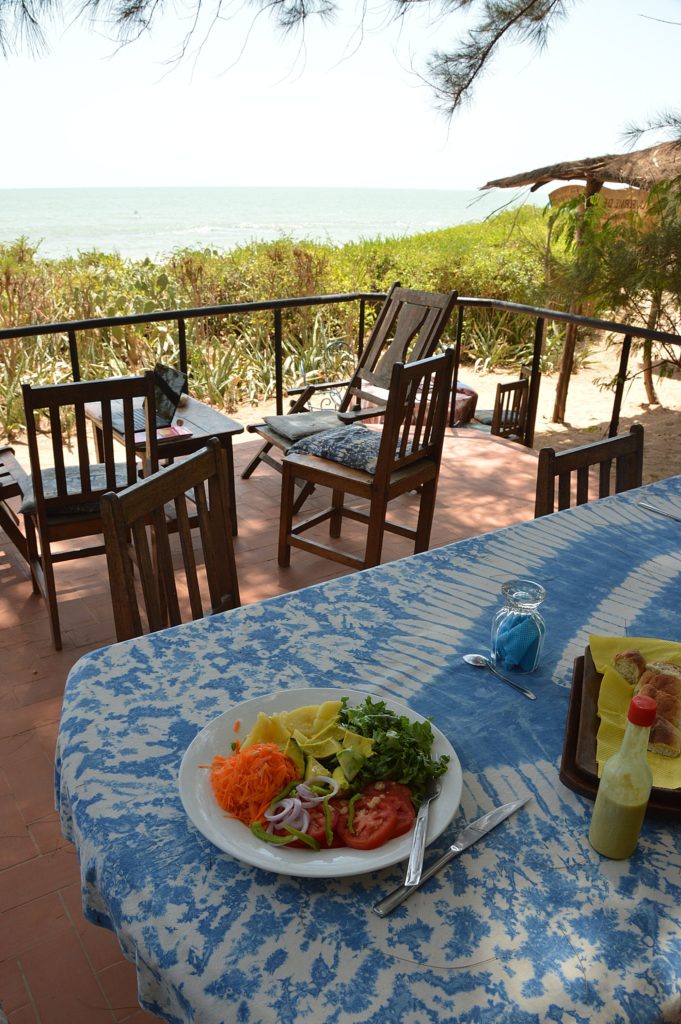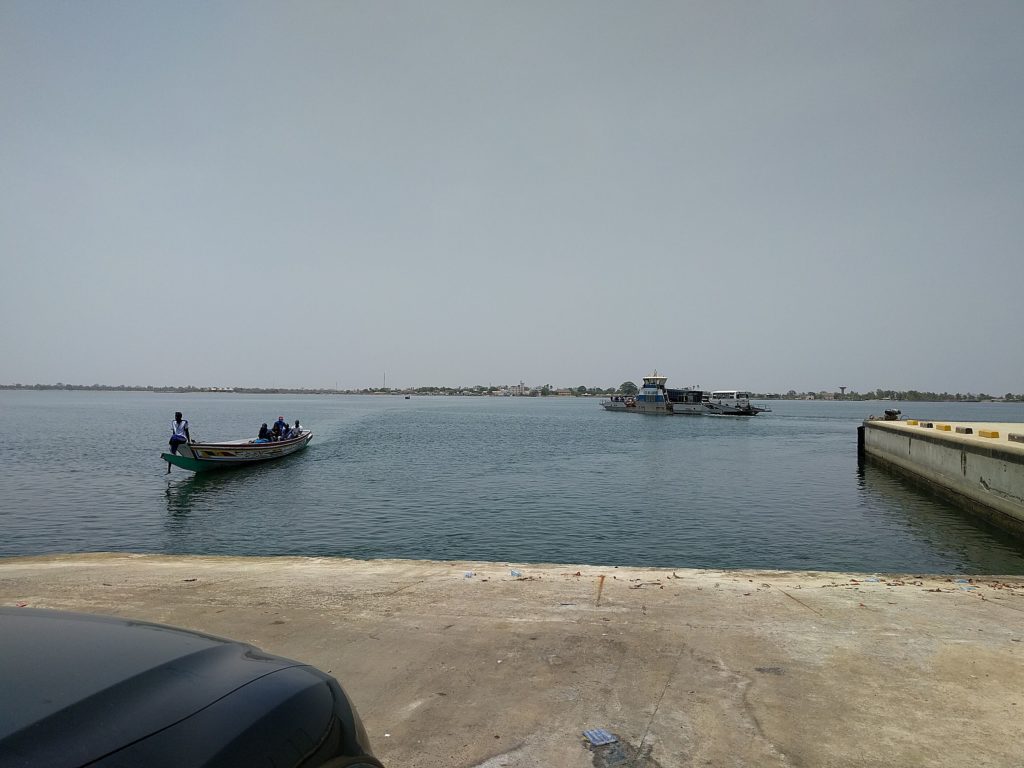This episode starts in one hot, dusty hotel car park about to cross a border, and ends in another hot hotel car park having just crossed a border. On both occasions, the option of sleeping in Troopy in the car park lost out to an air-conditioned room!
At the Oasis hotel in Tambacounda, back in Senegal, they take advantage of the lack of local camping spots to charge a pretty hefty price to let you camp out in their large, dusty car park. Others have been given the option of paying even more to use the small swimming pool, but today that wasn’t even allowed without booking a room. In comparison, a nice traditional style round hut room with aircon and no mosquitoes was a bargain. I can’t say the same for the food…which took a lot of explaining for an unexciting result…the curse of the pretentious hotel struck again and I was left with a basic salad. Breakfast was worse…instant coffee and bread. We cater much more imaginatively and with quality ingredients in Troopy!
Anyway, I started early and was driving through the already busy streets of Tamba towards the Niokolo-Koba National Park just after dawn. I stopped at the first checkpoint…and ended up giving a young fireman from St Louis a lift to work – 290km down the road in Kedougou. We had a good chat, learned a lot, and exchanged contact details when I dropped him off, though I don’t think he was at all impressed by my being vegan and having these crazy ideas that are not included in his religious code. His uniform and beret seemed to have the extra benefit of a free pass through any tolls and checkpoints!
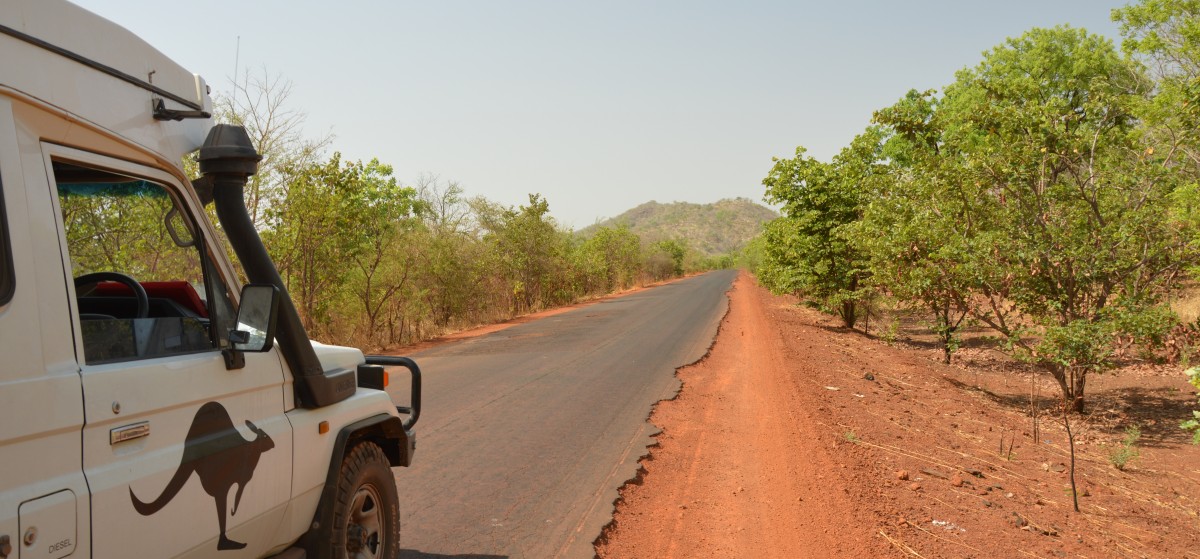
After that, the border was a relatively short drive on a good road, though approaching it I passed through a sprawling conurbation of straw, stick and plastic which seemed out of place and scale, until I spotted the Arcelor Mittal Exploration checkpoint at one end of it. This is Gold Rush territory.
The border itself was probably the quickest and easiest I’ve done and 15 minutes after rolling up I was in Mali. Part 1 of and epic day was completed, and I only had about 120km to go to get to Cool Camp – a place I had heard of through ‘the Hubb’ whilst reading up about border crossings into Mali. One problem I had had was working out which of the rather entertaining routes was which, since my collection of maps couldn’t agree whether or where the roads or tracks went. But I had half a day left, so when my chosen route began to turn into a rough track I just went with the flow. Then it turned into several very rough tracks going in all directions, and shortly afterwards into single-track motorbike trails through the forest. This was fun. Then it turned into a very rocky, narrow track climbing the escarpment to my right and I knew exactly which of the possible routes I was on.
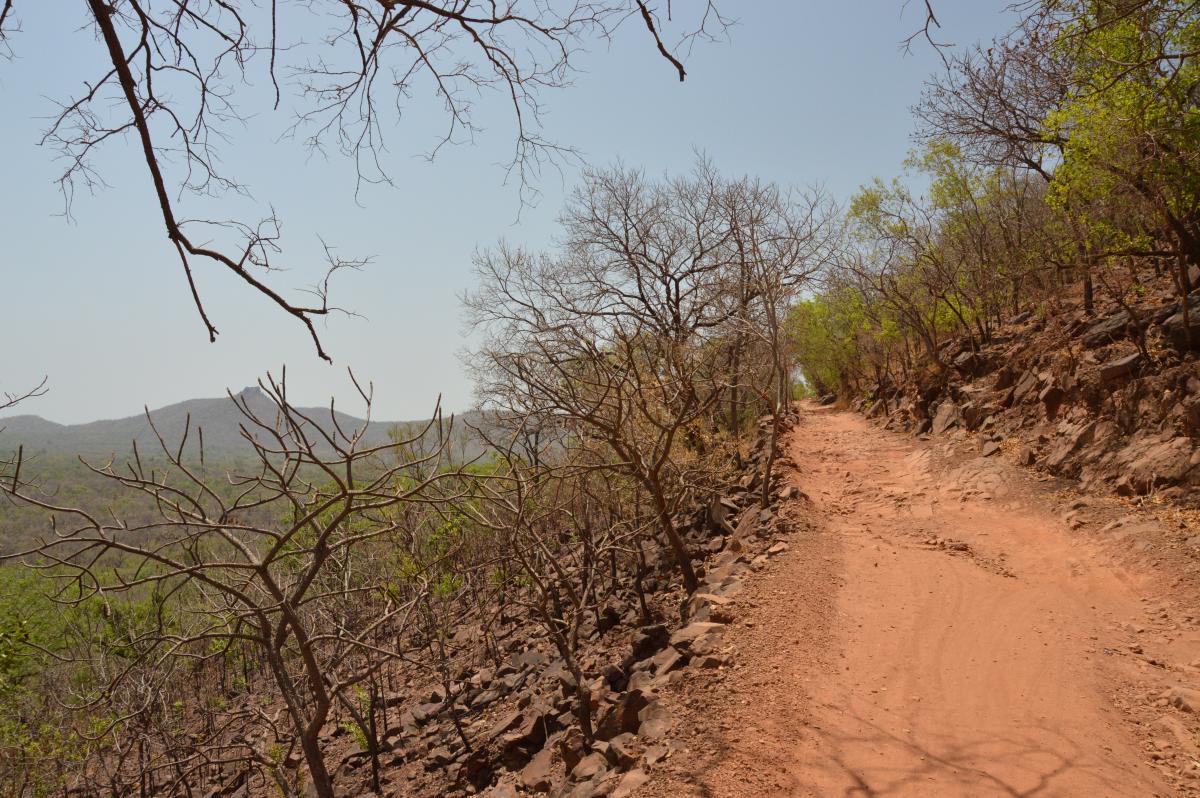
This is the old Route Nationale 24…not the nice new tarmac which seems to share its name. It hadn’t been clear from my brief research whether this route was still passable on 4 wheels, and it was soon very clear that large sections of it are used solely by locals on motorbikes. The route meanders through the forest between and through villages, and I was relying on Open Street Map to guide me…figuring that someone must have been this way to record the track? No?
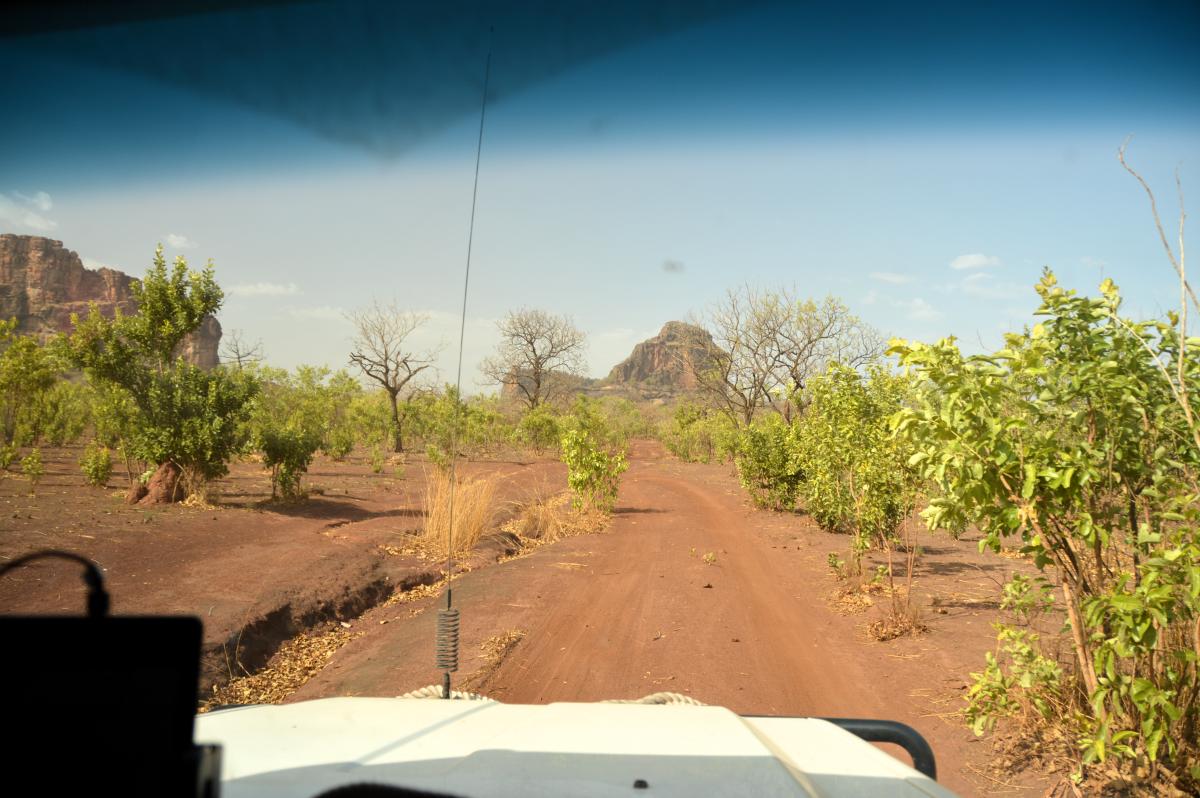
Sections of what was once a track have been washed out by successive rainy seasons, and the bikes have not seen fit to make the random detours wide enough for a car. Some places are just rock steps and even the bikes unload goods and passengers to climb or descend. I wasn’t half way before I was thinking that I’d had quite enough of this sort of fun, and just wanted to jump in the promised cool, clear water of the Bafing River.
When I finally got there, the experience did not disappoint. It was definitely worth the hours of slow, hot forest, and I just jumped straight in before even setting up camp or changing.
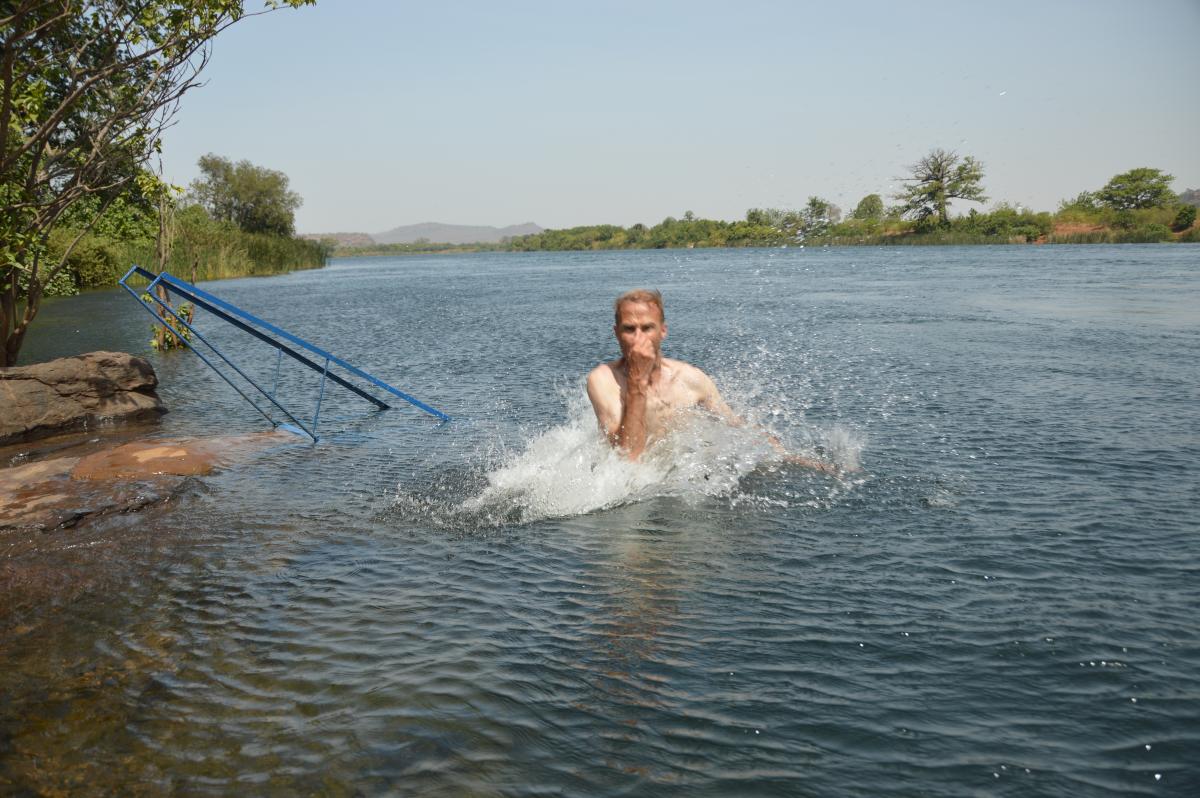
I had also instantly decided to stay another night rather than pushing on for Bamako on my visa hunt. Casper, who runs what is now my favourite overlanders-oasis in Africa, is a fantastic host and does a lot of work to help improve the lives of people in the area as well. Anyone finding themselves within a hundred miles should take a couple of days to relax and share tales here, though you might feel like staying a lot longer as he did! The establishment survives mostly on growing bananas these days as tourists have been scared off from Mali in general and this beautifully wild corner of the country sees little passing traffic. That just adds to its real charm. Oh yes, and he only charges a quarter of the price per night they asked me to park in that car park in Tamba a day’s drive away.
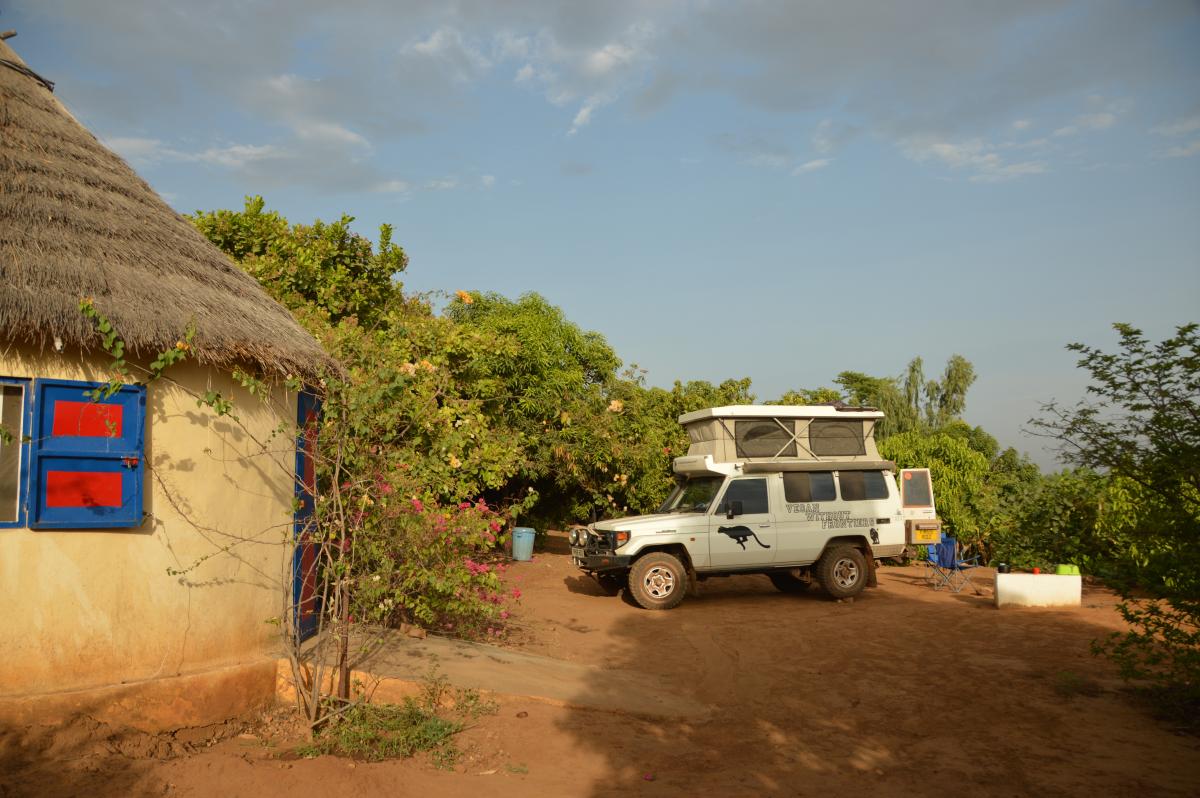
I camped in the shade of (though not under) the mango trees – “eat as many as you like” – and watched clear waters of the river glide past. In the end, though, I still had a mission to get a visa so had to leave and head to Bamako.
The forest thins out; the roads get busier and busier with black-smoke belching trucks and the dust and heat take over. The dirty, potholed urban sprawl of the approach does however suddenly give way to a wooded hillside descent into the city, tree-lined streets and a crossing of the Niger on a long bridge, surrounded by swarms of motorbikes. And so to The Sleeping Camel…base for the latest visa-acquisition expeditions. The Camel is a hidden oasis, and Troopy was the 3rd British overland vehicle in the compound when I arrived – that makes the other 2 the first 2 I’ve seen on this whole expedition so far! Various other visitors to Mali make the Camel a home from home in their time here, and are made to feel very safe and welcome by their hosts.
However, the mango trees are pretty huge here, and you really have to camp under them. Mangoes themselves seem to choose the middle of the night to conclude their business with the tree and make the swift transition to the ground, or intervening rooftent/windscreen/head, which can be alarming at best. Since mangoes in these parts can be the size of melons, it did make me wonder whether the history of physics would have been different were Mr Newton to have been sitting under a mango tree…even though the pits are wrapped in a tasty (usually)soft layer of fruit.
Outside the camp, if one manages to disconnect from the glaring tumour of the growing, poisonous city destroying the surroundings and sucking in resources down the tendril roads and their metastasised towns, it has a certain charm. The air is so hot it burns your face as you travel around in a broken Mercedes, stinging your eyes and filling your lungs with sand-blast-force. Everything is broken, and yet held together and functioning by what seems the pure character of the Malian people. In fact, nothing is wasted. We were on a Troopy-mirror-hunt when we detoured to visit an area on the hills to the North of the city…at the base of the old river cliff the streets are a mass of old, broken cars being disassembled and the parts cleaned and traded. The carcasses are broken up and the sheet metal reworked into packing cases on the lower slopes. Further up, all sorts of metal utensils are created, and on the upper slopes the remaining scrap is melted and moulded in tiny foundries dug into the sandy rock.
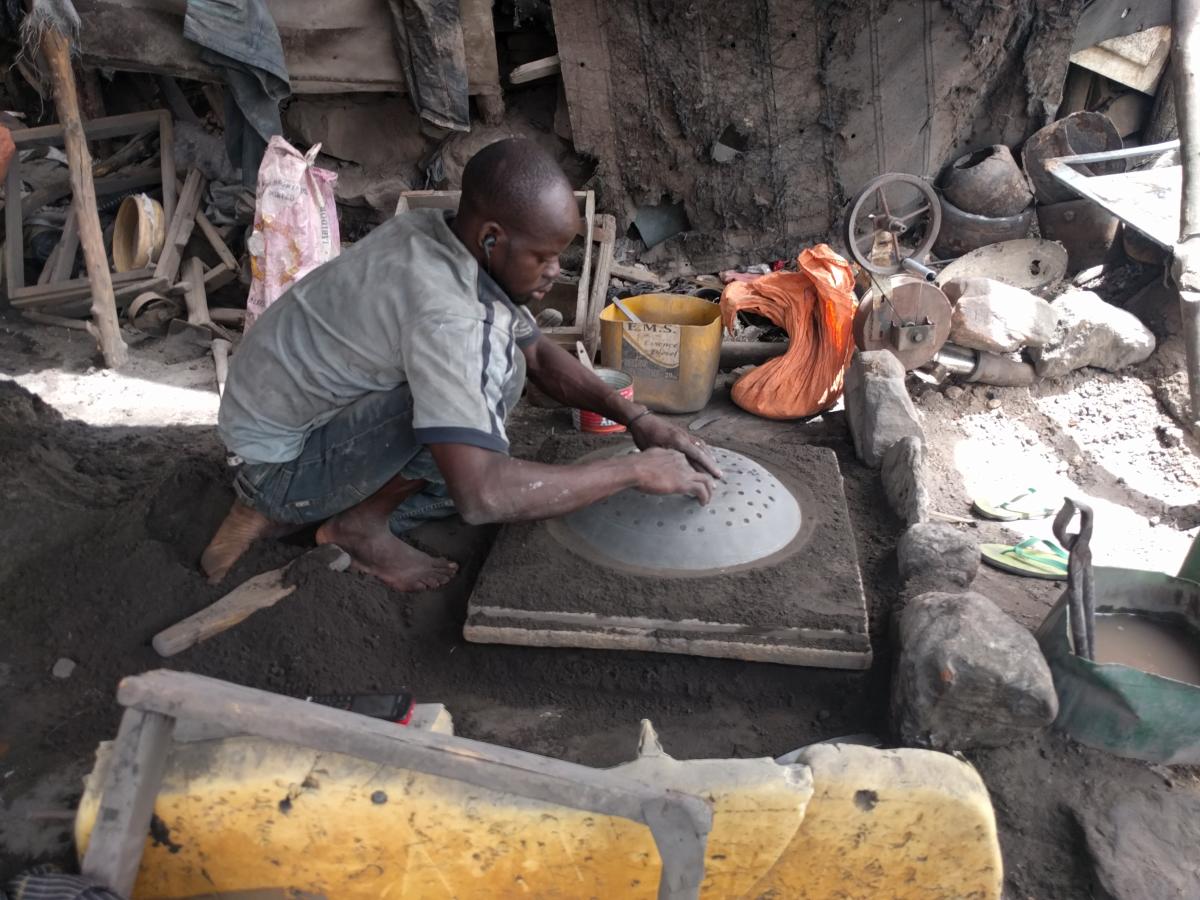
The heat and smell and sound is some crazy sort of music. If you disconnect from the natural world, it has a kind of beauty of its own.
Of course, I still failed to get a visa for Ghana, though had more luck after waiting in an empty Nigerian embassy for a few hours (they are moving to a new building somewhere else it seems…that will be fun for someone else soon…they won’t tell anoyone!). It was hard to leave the Camel, to leave friends, but the visa quest continues. I stayed in a very basic hotel in Sikasso, where the cook was only too happy to make me a nice salad and a tasty fresh vegetable soup whilst I watched the football. The journey through the forest continued at dawn, crossing another border while the border guards washed with water heated over a wood fire. Then on to Ouagadougou…I wonder if the place will live up to its most excellent name?
I was led to believe that the Pavillon Vert would allow camping in the grounds with use of a room for facilities. But it is very hot, and the hotel is empty so there was not much bargaining on this point from either side and I settled in to a reasonably priced airconditioned room with no mosquitoes. Sadly due to water shortages in Burkina Faso, there is also no water for most of the day. Time though for a cold beer and to watch mangoes fall on the cat…

